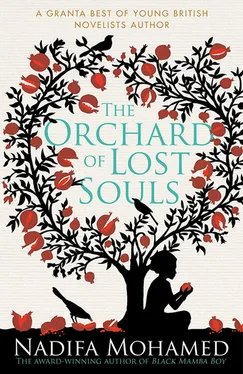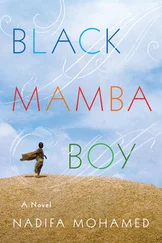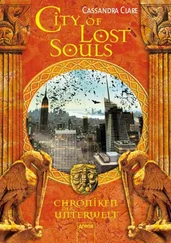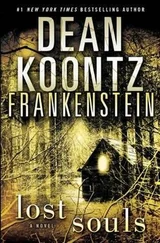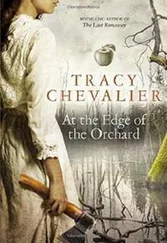‘Broken hip. Broken pelvis,’ the doctor declares, but she doesn’t trust him; he has spent no more than three minutes examining her, his eyes misted over with other thoughts. He seems to feel that her time is rightfully up, that her leaf is about to fall.
‘Can you not operate?’
There is annoyance in the doctor’s voice, ‘You’re too old, your bones would not stand up to it. Osteoporosis. The hospital is short of equipment for surgery anyway. I think all we can do is make sure the pain is under control.’
‘But will I walk again?’
Kawsar’s eyes have been fixed on the ceiling throughout the whole exchange.
There is no reply from him and a few seconds later he walks out of the ward with a nurse a few steps behind.
When she wakes later in the afternoon, she sees Dahabo glaring down at her. She lightly touches Kawsar’s bruised face. ‘Look at you.’
‘How the mighty have fallen. She beat me like a disobedient donkey.’ Kawsar smiles wanly, one of her eyes swollen and the left side of her vision blurred. ‘I’m surprised she didn’t kill me.’
‘ Joow, you are made of leather and bitterness, nothing can kill you. But if I could get my hands on her, I would skin her alive and make a handbag out of her hide.’ Dahabo squeezes the pillow in demonstration of her anger.
‘She is a child of her time.’
‘No, it is the other way around: those with sick hearts have made the time what it is, and what did you think you were doing anyway? Rushing away from us at the stadium like that? Did you lose your mind?’
‘Maybe. Hodan must have got it from somewhere.’
‘Kawsar. You have got to stop blaming yourself. No one can derail a person from their fate. She was loved more than any child I know, including my own.’
Dahabo’s voice never drops from the volume it takes to yell across a street.
‘Shush, Dahabo, can you not speak in a normal voice?’ Kawsar hisses. She doesn’t want the ancient woman in the bed beside her to overhear.
‘To hell with them, Kawsar, listen to me. You could not have done more for her. You bought the pills you were meant to, had the imam read her the Qu’ran, you kept her out of that place.’ She gestures through the window to the hospital madhouse. ‘What else? What else could you have done? Or I? Or anyone?’
‘I know. I know. Let’s not go over this again,’ Kawsar says quietly.
Dahabo clutches her shoulder. ‘You are old now and fragile, you have to be kinder to yourself.’
‘I want it to all end, Dahabo. Is that wrong?’
‘No, but your time will come, as will mine. Wait. You can’t throw yourself in danger, breaking a hip here, an arm there. Leaving me with another mouth to feed.’ She reaches down to pick up a basket. ‘I’ve put a few meals in here. I want the plates cleared, do you understand me?’
‘I can’t. .’ Kawsar feels guilty eating into Dahabo’s hard-earned income while hidden under her own mattress at home there are hundreds and thousands of shillings.
‘You will. Maryam and Raage will come to collect you tomorrow. Don’t fight anyone in that time if you can help it.’
Maryam and Raage arrive early in the morning to collect her, before the rush at his store. ‘Don’t forget the basket, it’s Dahabo’s,’ points Kawsar from the trolley, ‘check under the bed too, I might have dropped something.’
‘Yes, eddo ,’ Maryam bends down to check, ‘nothing.’
‘Good, let’s roohi then.’
Raage takes the lower end of the trolley and pulls it out of the ward.
They roll along the uneven, grey-tiled corridor, past queues waiting outside the TB clinic and paediatric wards. The strangers stare at her, grateful for a momentary diversion from the endless waiting. They stare most at Maryam; she was born and raised in Hargeisa, but the long nose she has inherited from her English mother points her back to Europe. With her wisps of yellow hair and light brown skin she has always made Kawsar think of a plastic doll that has been left out too long in the sun.
Kawsar has not visited the hospital since Hodan’s death and does not remember being brought in from the jail. She is in the main, low building left over from the British; the maternity and other small wards are scattered around it, and hidden beyond a high barbed-wire wall is the psycho-social unit. The morgue is a more recent extension, built to cope with the victims of Ethiopian bombing sorties over the city. The hospital is falling into ruin, the inside walls are cracked, the plaster peeling, creepers snaking their way through the windows.
An orderly in a khaki jumpsuit stops them at the main entrance. ‘You cannot take the trolley beyond this point,’ he says, grabbing hold of the rail above Kawsar’s head.
‘We are just taking her to the car. She can’t walk,’ Maryam argues, trying to pull the trolley with her.
‘Leave it here, don’t you have ears?’
‘You put a donkey in uniform and see what happens,’ Maryam shouts back.
‘What? Should I call the police? You can tell them what you think about donkeys and uniforms.’
‘To hell with you.’
‘Let’s go, Maryam, quickly please,’ Kawsar begs.
‘Ko, labah, sadeh, one, two, three. .’ Maryam and Raage pick up the thick woollen blanket underneath her and lift Kawsar into the air. Neither is strong and they struggle to walk without losing grip of the blanket, but they persevere until she is safely manoeuvred into the long, grimy boot of the red Toyota.
Raage starts the engine and drives out of the hospital grounds. ‘Go as slowly as you can,’ orders Maryam.
Kawsar does not hear if Raage replies; there is a sudden numbness to her senses from the painkillers, a cushioned distance between her and the rest of the world. She looks through the dust-haloed back window, streaked with the scum of dead flies, at the passing trees bowing down to her and fluttering their green fans.
Kawsar seems to float a few precious inches as the car dips into potholes and weaves around ditches. ‘Where are we?’ she asks, disorientated.
‘Going past the old women’s college, our college,’ smiles Maryam, squeezing her hand.
‘Near where I met Farah. .’
‘What did you say?’ Maryam bends down to hear.
‘Nothing,’ she replies, closing her eyes.
She had first seen Farah while dawdling home from the Women’s Technical School with Dahabo. It was a languid, dry season day, her shadow huge and black behind her, and they were teasing each other as they held hands. A lunatic was on the run from the mental hospital, weaving his sticky web of insanity over the town. Kawsar always imagined him as a man-spider who had clambered out of the English asylum they’d trapped him in and sailed back to Somaliland on driftwood. The girls passed telegraph poles in which his teeth marks were visible, his hundred white incisors imprinted onto the fresh black paint. Kawsar had heard at college that devil voices pursued the madman through the telegraph wires, his mind burnt up by the fire in their words. At every junction policemen lay in wait for him before he killed again. A tall, young policeman was standing with a red-haired Englishman at the crossroads ahead. There was no main road in south Hargeisa then, just a track tramped down by camel caravans, and the girls crossed to the other side so the men would not come too close. Dust hung in the air between them, lit gold and orange by the weary sun, and she accidentally caught the eye of the Somali policeman as she watched it glitter.
‘We’re here, eddo. I’ll get help from the hotel.’ Maryam crawls out of the car. She returns moments later with a crowd of men, their silhouettes black against the sun, their voices and hands indistinguishable, innumerable.
Читать дальше
